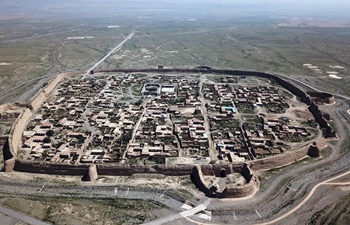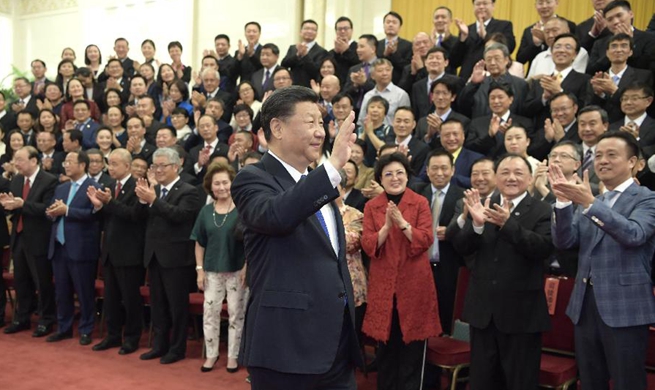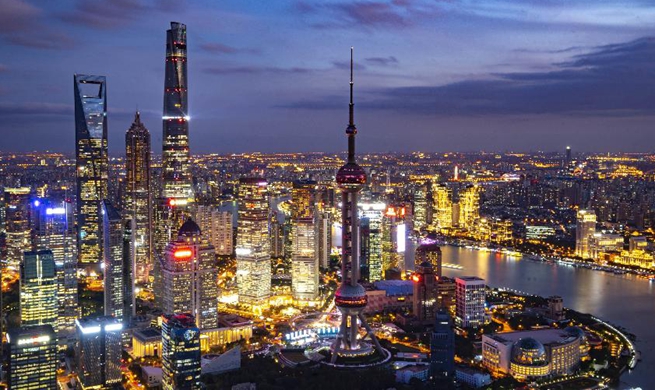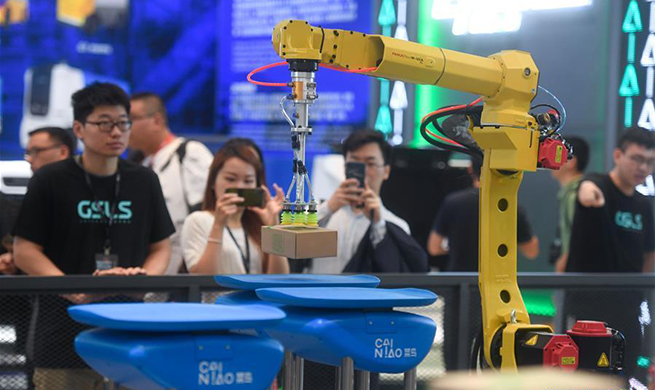LONDON, May 29 (Xinhua) -- British Prime Minster Theresa May said on Friday that she will quit as leader of the Conservative Party on June 7, paving the way for the process of electing her successor.
The race that offers the keys to 10 Downing Street starts officially on June 10. But a list of likely contenders has already emerged, with eight Conservative MPs having already stated their intentions to run.
Following are major facts about the eight challengers presented in alphabetic order by the last name.
Michael Gove
Michael Gove, born on Aug. 26, 1967 in Edinburgh, the capital city of Scotland, has served as Secretary of State for Environment, Food and Rural Affairs since 2017.
Gove emerged Sunday as a challenger to become leader of the Conservative Party.
"I believe that I'm ready to unite the Conservative and Unionist Party, ready to deliver Brexit, and ready to lead this great country," he told reporters outside his home.
He has worked on the "Leave" side in the 2016 referendum campaign, and has been loyal to May since returning to the cabinet although he opposed a second referendum.
Gove has not tied his hands by promising to get Britain out of the European Union (EU) by October, and suggested he will push first and foremost for a deal.
Matt Hancock
Matt Hancock, born on Oct. 2, 1978, in the county of Cheshire, has served as Secretary of State for Health and Social Care since 2018.
He announced Saturday his intention to replace May.
Hancock does not pursue a no-deal policy. Opposing May's deal, he said a new prime minister should be clear about the trade-offs "between sovereignty and market access to get a deal through this parliament."
He also said that he would avoid a general election until Brexit is delivered.
Jeremy Hunt
Jeremy Hunt, born on Nov. 1, 1966, in the district of Kennington in south London, has served as Foreign Secretary since 2018.
He became the first front-line politician after May's resignation speech to throw his hat into the ring in the contest.
Dubbed a "born-again Brexiter" by colleagues, Hunt once backed "Remain" during the 2016 referendum campaign, but later changed his mind on the issue in part due to what he said was disappointing "arrogance" in the EU's behavior during negotiations.
He has called for a statesmanlike and robust approach to trying to renegotiate the withdrawal agreement, despite the insistence that re-opening the deal already agreed by the EU council is not up for re-negotiation.
Hunt said that a policy of seeking to take Britain out of the EU without a deal would be political suicide.
Boris Johnson
Boris Johnson, born on June 19, 1964, in New York City, is the favorite to succeed May.
He served two terms as Mayor of London from 2008 to 2016, and served as Foreign Secretary from 2016 to 2018. On July 9, 2018, Johnson resigned over May's proposals for a soft Brexit.
About two weeks ago, Johnson confirmed his intention to run for the Conservative Party leadership.
Being a hardline pro-Brexit candidate, he has clearly set out his view that Britain must leave the EU by the end of October, and he is willing to crash out of the bloc with no deal if Britain and the EU fail to agree an accord on a future relationship.
"We will leave the EU on Oct. 31, deal or no deal. The way to get a good deal is to prepare for a no deal," he said.
Andrea Leadsom
Andrea Leadsom, born on May 13, 1963, in the county of Buckinghamshire, was one of the two finalists in the 2016 contest to become leader of the Conservative Party and the next British prime minister.
She served as Leader of the House of Commons from 2017 to 2019, and resigned on May 22 saying she could not support May's new withdrawal agreement despite being one of May's staunchest supporters earlier. She confirmed last week that she will run the campaign.
Leadsom is a Brexit pragmatist who preferred a deal but also supported a no-deal Brexit at the end of October "if necessary." She also opposed a second referendum.
She said via her Twitter account that she has "a three step plan" for how to deliver Brexit.
Esther McVey
Esther McVey, born on Oct. 24, 1967, in the city of Liverpool, served as Secretary of State for Work and Pensions from January to November 2018.
She resigned on Nov. 15, 2018, in opposition to the Brexit negotiations and the withdrawal agreement.
On May 24, McVey confirmed her intention to bid for the party leadership.
Being a hardline pro-Brexit candidate, McVey held out against May's deal throughout the various votes, and said that leaving the EU with no deal is the only option left.
"Political suicide actually lies in not having a clean break from the EU and not leaving on Oct. 31," she said via her Twitter account.
Dominic Raab
Dominic Raab, born on Feb. 25, 1974, in the county of Buckinghamshire, served as Secretary of State for Exiting the EU from July to November 2018.
He resigned as Brexit Secretary on Nov. 15, 2018, in opposition to the draft Brexit agreement which he had been involved in negotiating with the EU.
Raab set out his leadership campaign on Sunday, promising to take Britain out of the EU on Oct. 31 regardless.
He said via his Twitter account that he plans to "fight for a fairer deal in Brussels, a fairer deal for workers and a fairer society," but also vowed to keep a no-deal Brexit on the table.
Rory Stewart
Rory Stewart, born on Jan. 3, 1973, in Hong Kong, has served as Secretary of State for International Development since May 1, 2019.
He put himself forward shortly after assuming office earlier this month.
Stewart is one of the softest Brexiters running the campaign, who said that he wants to leave the EU with a deal and then move on to tackle pressing domestic policies, and that he is not a fan of a second referendum.
He said via his Twitter account that "a no-deal Brexit would in a single day undermine 400 years of our reputation for economic stability and competence."
In an interview with a Hong Kong newspaper, Stewart attacked the no-deal Brexiters for "Wizard of Oz" thinking.













